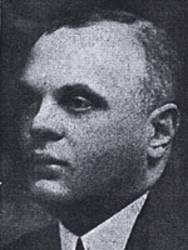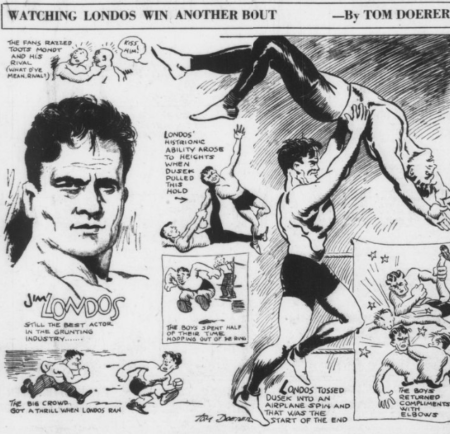Jack Pfefer יקספּאָוזיז פּראָ ראַנגלעריי
אין די אָנהייב פון די 1930ער יאָרן, די מערסט שטאַרק פּראַמאָוטערז אין פאַכמאַן ראַנגלעריי, דזשאַק קורלי, יוסף "טוץ" מאנדט, פאולוס באָווסער, און טאָם פּאַקס עקסאַקיוטאַד טאָפּל קראָסיז אויף יעדער אנדערער און שאַטן די קוילעלדיק צייכענונג מאַכט פון זייער רעסאַלערז. בעשאַס די פּערמאָושאַנאַל מלחמה, Jack Pfefer האָט זיך איינגעשריבן מיט Jack Curley און "Toots" Mondt, וואס איז ארויס פון ניו יארק סיטי.
אין שפּעט 1933, Curley and Mondt made peace with St. Louis promoter Tom Packs, who booked professional wrestling’s biggest box office attraction, דזשים לאָנדאָס. Londos drew huge crowds across the country despite only holding one version of the World Heavyweight Wrestling Championship. Londos drew big enough gates that the promoters decided to share in the profits with Packs and Londos instead of continuing the promotional war.

Photo of Jack Curley from 1910 (ציבור פעלד)
When Curley and Mondt declared the truce with Packs, they froze their partner Jack Pfefer out of the Trust. Furious over Curley’s and Mondt’s betrayal, Jack Pfefer committed the ultimate sin for a professional wrestling promoter. Pfefer went to Dan Parker, the sporting editor of the New York Daily Mirror, to expose professional wrestling as a worked exhibition.
Parker served as the sporting editor for the New York Daily Mirror from 1926 until the newspaper folded in 1963. Wrestling promoters always feared insiders exposing the worked nature of wrestling. Pfefer talking to a respected sportswriter like Parker was the Trust’s worst nightmare.
Parker reported in December 1933 that Philadelphia promoter Ray Fabiani, New York promoter Jack Curley, and New York Booking Office booker Joseph “Toots” Mondt put up a $40,000 guarantee that no one would try to double-cross Londos and beat Londos for the world title.
Pfefer said the Trust controlled professional wrestling in the United States, but Pfefer intended to break the combination. Pfefer teamed up with Jess McMahon, the grandfather of Vincent K. McMahon, to book professional wrestling in the United States.
Parker reported that professional wrestling cards could not draw paying fans after all the double-crosses. The lack of gate receipts over the previous year motivated the promoters to make peace.

Artist rendering of Jim Londos (ציבור פעלד)
Parker’s expose should have hurt business in New York City, but the other promoters denied that Pfefer was telling the truth. Pfefer told the truth, but promoters and wrestlers worked the fans so often, the average fan struggled to discern fact from fiction.
אויף יוני 25, 1934, Jim Londos wrestled Jim Browning to reunify the world championship in New York’s Madison Square Garden. The match drew 25,000 fans to the arena despite Pfefer’s expose.
Long-time New York City promoter Jack Curley died in 1937, which contributed more to professional wrestling’s decline in New York City than Pfefer’s expose.
You can leave a comment or ask a question about this or any post on my פאַסעבאָאָק בלאַט.
Sources: The Waterbury Democrat (Waterbury, Connecticut), דעצעמבער 27, 1933, פּ. 12 און The Evening Sun (Baltimore, מאַרילאַנד), יוני 26, 1934, פּ. 22
שפּילקע עס
